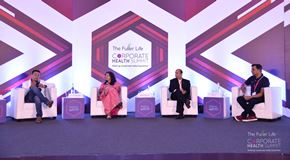At the 4th edition of the Corporate Health Summit, experts from across the health and wellness space in India gave their inputs on employee emotional health and majorly define the path of wellness ahead in the corporate sector. This included HR, EHS, insurers, insurance brokers and wellness companies.
The first panel focused on employee emotional health. We had Monica Pillai, who is a People function catalyst for small and growing organizations, as the moderator and speaker. Unmesh Pawar, Head – People, Performance and Culture, KPMG, along with Anjali Rao, Head – India Human Resources, Intel Technology India, and Karuna Baskar, Director, ResilienceWorks, POSH consultant, gave their insights for this panel.
The discussions at the panel highlighted many startling facts. One of them as Monica pointed out, was that around 50% of the urban Indian population experiences some variant of anxiety or depression. “It is an invisible illness; unlike a headache or breaking a leg, people could be experiencing this and have this completely happening to them”, she said. She also highlighted that there was shame attached to acknowledging it and asking for help.

Currently, organizations have fairly robust EAP programs in place that are highly thought through. A lot of thought has been put into developing and designing programs in order to provide support to the employees.
Karuna Baskar shed light on how people realize that they could be knee deep into a problem, but they don’t reach out. They are not in a mental space to reach out by themselves; that is when they need an extra nudge, a reminder that help is available. This has to be done tactfully, without being intrusive.
Everyone is going through different life stages and associated issues arising during these stages. We may misjudge our capability of handling the issue, not realizing how much of an impact that situation can actually have. Awareness needs be brought to how people can get help even if it looks like a simple issue at the surface level. Awareness building at multiple of levels from the corporate, providers, media, etc. should be utilized to get this message out there. Karuna added that, having celebrities in the forefront of spreading awareness is having a great impact.
Unmesh pointed out that when one is dealing with things on the personal front, it creeps into their work even if it is without their knowledge. It starts to impact one’s decision making processes, motivation and emotional flexibility at work. When one realizes this, they need to be transparent with their line managers and supervisor. They need to be keep them informed that they are going through a personal crisis and address it; that there could be moments of lapses and therefore are seeking help.
As the panel discussion continued, Anjali Rao mentioned the tricky territory that a company could be stepping into, while asking employees to seek help. The organization needs to realize that this should not prevent anyone, (in the roles that they hold or in the professions that they follow) from putting in place processes and programs. She also opined that effort should be directed towards making sure that all employees have ways to seek help and also provide help.
As a means to make help more accessible, Anjali Rao spoke about the ways in which the reluctance around seeking help for emotional health can be surmounted. With substantial advocacy, campaigning and improved communication regarding mental health awareness, employees can be kept informed that there are many avenues and ways to raise issues to seek help and support.
A person can look out for signs- physical or behavioral within themselves or others. This includes keeping a check on overwhelming feelings of sadness or anger, which may seem out of proportion to the situation. Snapping at someone, or reacting to something unrelated to the present circumstance; these could be warning signs. “Sometimes you can see it better in yourselves, if not in others”, Karuna added.
Reaching out for help should be viewed as a sign of strength, rather than weakness. One must do anything it takes to normalize and build awareness in this regard; that it is an okay thing to seek help. This provision of assistance should be emphasized as something professional; it is a formal aid someone could reach out to, rather than sharing ones woes with a close friend or relative. The professional guidance will assure the employees that their information is confidential. This message was evident and conveyed multiple times throughout the discussion.
Is your company doing anything to focus on employees’ emotional and mental wellness? Do you want to improve your company’s wellness plan or need help in making one?
The Fuller Life has partnered with many companies to put in place, effective Employee Assistance Programs. If you are looking for an expert guided wellness plan for maintaining employee emotional health of your organization, do reach out to us.
+91 99809 30541 | reachus@thefullerlife.com






